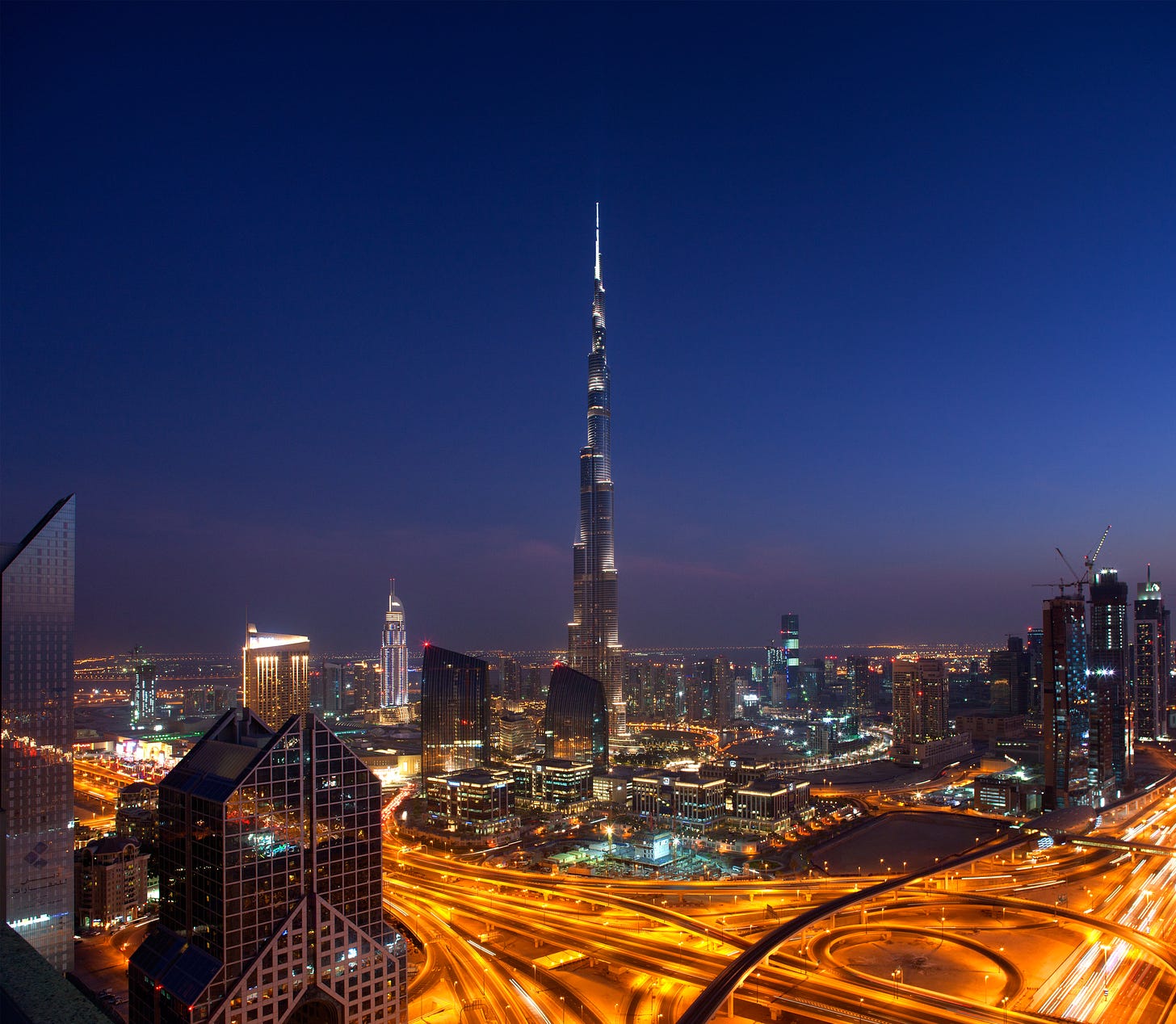Emerging Markets Daily - November 2
Global Investors Turn Cautiously Positive on China, Brazil NuBank's Big $50B NY IPO, Mexico Broadband, Saudi Cuts Ties With Lebanon, Dubai Aims to Double Market Size
The Top 5 Stories Shaping Emerging Markets from Global Media - November 2
Global Investors Turn Cautiously Optimistic on China
Financial Times
“Investors and analysts have started to turn positive on China, three months after a regulatory shock that led some to wonder whether the country had become a no-go zone for money managers.”
“HSBC turned overweight on Chinese stocks last week, predicting the country’s equity markets were nearing their lowest point and would return to growth for the first time since Beijing issued sweeping regulatory controls to rein in sectors from technology to education.”
“The bank said it was advising clients to start buying again and that customers had been calling to discuss opportunities. ‘I expected [clients] to tell me I’m nuts to go overweight on China, but actually they told me they are thinking the same,’ said Herald van der Linde, chief Asia equity strategist at HSBC. ‘Looking into 2022, sentiment will be very different,” he said, noting it would be a ‘political year’ because of the 20th congress of the Chinese Communist party in November. ‘Normally leaders don’t want things to be very volatile in years like this.’
“Fidelity, which manages assets of $738bn, said it had become ‘incrementally positive’ on China and had started to increase its exposure. ‘It was when people were asking if Evergrande was going to be China’s Lehman Brothers moment and whether the China investment case was broken, that we . . . looked to take advantage,’ said Paras Anand, Fidelity’s chief investment officer for Asia Pacific.” Tabby Kinder and Hudson Lockett report.
Brazil’s Nubank Seeks $50.6 Billion Valuation in Blockbuster New York IPO
Bloomberg
“Nu Holdings, the Brazilian digital bank backed by billionaire Warren Buffett’s Berkshire Hathaway Inc., is seeking a valuation of as much as $50.6 billion in its initial public offering, making it one of Latin America’s biggest companies.”
“Nubank, as the firm is known, will market at least 289 million shares for $10 to $11 each, according to a filing Monday with the U.S. Securities and Exchange Commission. At the top of that range, it would debut as the region’s sixth most valuable firm and its largest financial institution.”
“With plans to raise more than $3 billion, Nubank’s IPO would be the third-largest on a U.S. exchange in 2021. It would trail only the South Korean e-commerce company Coupang Inc. and China’s biggest ride-hailing company, DiDi Global Inc…”
“The world’s biggest standalone digital bank, Nubank is at the forefront of financial-technology upstarts that are upending Latin America’s financial system. Created in 2013, the Sao Paulo-based firm reached 48.1 million customers across Brazil, Mexico and Colombia as of September, growth it credits to easy-to-use financial products with lower fees.”
“A successful IPO would also be a boon for Berkshire Hathaway, which invested in the company last June. At the time, Berkshire privately purchased a $500 million stake, valuing Nubank at $30 billion, a person familiar with the matter said at the time.” Felipe Marcus and Vinicius Andrade report.
Mexico Mobile Subscriptions Near 100 Million
Emerging World
There’s a fascinating chart (see below) that just landed over at Statista. It outlines Mexico’s mobile broadband subscriptions over a ten year period. From a paltry 4.82 million in 2010 to nearly 100 million today, this is a chart of an increasingly wired country.
America Movil is the dominant player, followed by AT&T, and Telefonica, Statista reported. By the year 2025, Mexico will be second to Brazil in terms of the largest number of 5G connections in Latin America. In 2020, Mexico was already second to Brazil on the number of cellular subscriptions, at 120 million.
Mexico’s e-commerce market is still tiny, compared to the United States, and still very small compared to the broader retail market. J.P Morgan reported in 2020 that e-commerce accounts for only 2.2% of Mexico’s retail spending. But the pandemic has changed the hesitancy of the Mexican e-shopper, driven by food delivery and fashion products.
With a chart like the one below, expect more players to pile into Mexico’s still young e-commerce and fintech markets.
Geopolitics: Lebanon Economic Crisis Sharpens as Saudi Arabia Cuts Ties
Wall Street Journal
“Saudi Arabia banned imports from Lebanon and, along with three other Gulf states, expelled its ambassador following remarks by an official about the war in Yemen, as long-simmering tensions over Iran’s influence in Lebanon spill over and threaten to damage its already disastrous economy.”
“The comments, made by Georges Kordahi in August before he left a high-profile television job to join the government as information minister, centered on the Saudi-led intervention in Yemen against Houthi rebels, who, backed by Iran, deposed the Yemeni government in 2014 and now control much of the country. ‘The Houthis are defending themselves in the face of foreign aggression,’ he said in an interview aired by Al Jazeera…”
“The Gulf states have been dismayed by failure of other political factions to offset Iran’s sway in Lebanon, which has provided Tehran access to the Mediterranean as well as regional influence through Hezbollah, a political and militant movement with operations in Syria and Yemen, too…”
“The most serious blow so far is Saudi Arabia’s move on Friday to suspend imports from Lebanon, which the Saudis say is for Beirut’s failure to prevent drug smuggling through ports controlled by Hezbollah. Saudi Arabia is an important trading partner, a key customer for jewelry and agricultural produce, and a valuable source of remittances from the thousands of Lebanese citizens who work there, though they are as yet unaffected by the dispute.”
“Previously, Saudi Arabia had spent billions of dollars to strengthen Lebanon’s security forces following the end of the country’s civil war in 1990 and counter Iran’s influence in the country, but halted much of that aid in 2016.” Stephen Kalin and Nazih Osseiran report.
Dubai to List 10 State-Owned Companies on Market, Aiming to Double Its Size
The National
“Dubai plans to list 10 government and state-owned companies on the Dubai Financial Market as part of a broader strategy to double the financial market's size to Dh3 trillion ($816.7 billion).”
“The emirate's authorities also launched a market maker fund worth Dh2bn as it seeks to encourage listings from sectors such as energy, logistics and retail.”
“A fund worth Dh1bn will be formed to attract more technology companies to list in the local bourse and encourage innovative products, Sheikh Maktoum bin Mohammed, Deputy Prime Minister and Minister of Finance, tweeted on Monday, following the first meeting of the Securities and Exchange Higher Committee.”
"‘Dubai has a stock market, Nasdaq Dubai, and a gold and commodities exchange. We are the second largest Islamic sukuk centre in the world and the third highest country in diamond trading. We have one of the largest gold exchanges, we are the largest country to re-export tea and we have exchanges to trade these commodities. Our next stop will be to organise digital assets for the future,’ he tweeted.” Mary Sophia reports.
What We’re Also Reading…
Also….
Philippines First Unicorn
“Mynt, the Philippine fintech company backed by China’s Ant Group and Globe Telecom of the Philippines, has become the first unicorn in the country after raising US$300 million from global investors such as US-based Warburg Pincus and Insight Partners,” The South China Morning Post reports.
“The new round of funding, which underlies the rapid growth of the financial services and digital banking market in the country, has boosted Mynt’s valuation to US$2 billion. ‘This solidifies its status as the Philippines’ only unicorn, and as one of the leading fintech companies in Southeast Asia,’ said Warburg Pincus, which has more than US$67 billion in private equity assets under management, in a statement on Tuesday.”
Brent Crude to Hit $120 by End of June, BofA Says
“Bank of America expects Brent crude to hit $120 a barrel by the end of June 2022,” Bloomberg reports.
“A global energy crisis has sent prices for gas and coal soaring around the world, and this has turbocharged the recovery in benchmark London- and New York-traded oil futures, Bank of America Corp. analysts including Francisco Blanch wrote in a note.”
“Several oil traders have said $100 crude is fast approaching as demand outstrips supply and a climate-inspired slowdown in investment in new sources threatens to allow reserves to wither. A surge in gasoline demand along with a rebound in middle distillates -- think diesel and jet fuel -- coupled with refining-capacity constraints could accelerate the rally into 2022, the analysts wrote.”
“I’ve missed more than 9000 shots in my career. I’ve lost almost 300 games. 26 times I’ve been trusted to take the game winning shot and missed. I’ve failed over and over and over again in my life. And that is why I succeed.” – Michael Jordan





